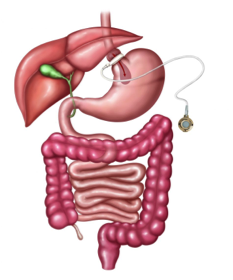Adjustable Gastric Banding
We do not place adjustable gastric bands because of the high number of complications associated with these devices. However, we provide advice, maintenance, and removal of these bands for patients who have had this type of surgery.
Aftercare
The UF Health Bariatric Surgery Center currently only provides maintenance and removal of bands for patients who have already had this type of surgery.
Keep in mind, with any of these surgeries, the key to success is a lifelong commitment. You will need to adhere to strict dietary and nutrition goals in order to maintain a healthy lifestyle. We also provide monthly patient support groups to help you on your weight loss journey.
Please contact our bariatric coordinator, Gwen Crispell, MSN, RN, CBN at (352) 265-0111 x29634.
Diet Information
Bariatric surgery is an excellent way to limit the amount of food you eat and assist in weight reduction, but significant changes in your diet and lifestyle by you are required to achieve maximum success. After your bariatric surgery, you will be losing weight very rapidly. Hence, proper nutrition, mineral and vitamin supplement are essential to maintain lean body mass (muscle), hydration and skin elasticity, and to minimize hair loss.
Primary nutrition goals after surgery
- Learn proper eating habits and behaviors that will promote continued weight loss.
- Consume adequate amounts of protein to minimize loss of lean body mass and facilitate wound healing.
- Take adequate amounts of fluid to maintain hydration.
- Make healthy food choices to take in proper nutrients for optimal health.
- Replenish vitamin and mineral supplements.
- The post-surgery meal plan requires a significant change in meal planning for most people. We recommend that you begin adapting your current meal plan to prepare for this change.
- Avoid fried or high-fat and sugar foods at all costs.
Nutrition Plan
To lose weight effectively and permanently, you must be an active participant in your metabolic and bariatric surgery program. Surgery will help you to lose weight, but it is not “magic.” A well-balanced nutrition plan is necessary to help you reach and maintain your goal weight and health. Positive changes and choices in your eating habits also are necessary to help you reach your goals of good health and weight control. After you are discharged from the hospital, you need to follow the diet plan stages outlined below, which progresses from liquids to solid foods over a period of eight weeks.
- Post-Op Stage 1 Liquid Foods, Weeks 1 and 2
- Post-Op Stage 2 Pureed Foods, Weeks 3 and 4
- Post-Op Stage 3 Soft Foods, Weeks 5 and 6
- Post-op Regular Foods Week 7 and Beyond
You will have personalized scheduled appointments with the dietitian to transition you through the stages after surgery. Our dietitian is available to answer questions through MyChart, a phone call or during support group sessions-its just a matter of you reaching out.
Dietitian’s Role
Before your discharge from the hospital, the dietitian will instruct you on the bariatric surgery nutrition plan. You will be provided written and verbal information reminder of how to advance from liquid to solid foods.
The dietitian will evaluate your overall nutritional intake and make recommendations on how to improve or continue your progress. The bariatric dietitian will help you identify problems, make suggestions on how to correct them and answer any questions you may have about your individual nutritional plan.
Remember that surgery is not a magical answer to losing weight. The more involved you are in your nutritional plan, the better your results will be. Be an active participant.
Vitamin and Mineral Supplements
The first few months after your surgery you will consume a very low-calorie diet. Due to the volume restriction of your new stomach, it will be difficult to eat a sufficient variety of nutrients each day. Hence, vitamin and mineral supplements are required for a lifetime. You will need the following supplements initially:
- Daily multi-vitamin – Should be chewable and contain at least 400 mg folate, 18 mg iron and 15 mg zinc and calcium citrate.
- Calcium citrate – Calcium must be in a citrate form, and you must take a total of 1200 mg of calcium each day in divided doses. If you also are taking iron supplements, you we recommend your iron and calcium supplements be ingested two hours apart.
- Iron – Women who are menstruating or who have a history of anemia must take supplemental iron. Take your iron with a multi-vitamin or a vitamin C supplement for enhanced absorption. Iron supplements may cause constipation, so you may wish to take an over-the-counter stool softener when you begin taking iron.
- B-12 – You will need B12 supplementation either by injection or sublingual. Examples of bariatric surgery recommended supplements include Bariatric Advantage®, Celebrate® Nutritional Supplements and UNJURY® Medical Quality Protein, and BariatricPal.
